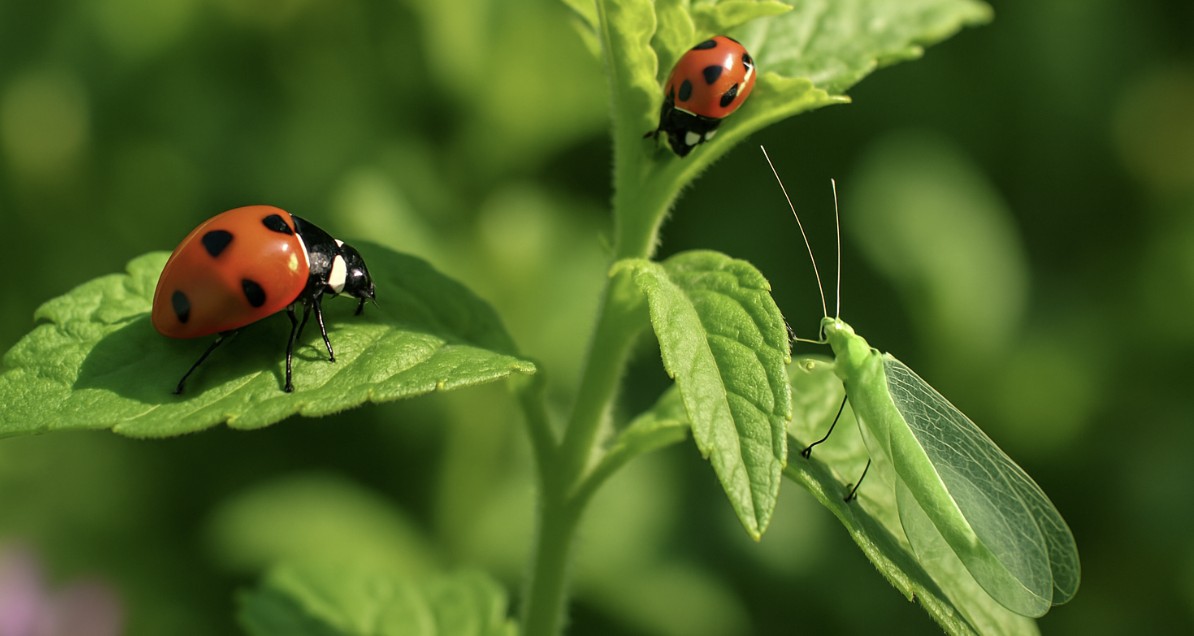When it comes to sustainable and chemical-free pest management, Insight Pest Management is always exploring safer, smarter, and more environmentally responsible solutions. One increasingly popular approach in both agriculture and home gardening is biological pest control — using beneficial insects to naturally reduce pest populations. But how do these insects work, and are they right for your pest problems?
What Is Biological Pest Control?
Biological pest control is a natural method of managing pest populations through the use of living organisms — usually insects, mites, or microorganisms — that are natural enemies of the pests causing damage. Instead of relying on synthetic pesticides, which can harm the environment and beneficial species alike, this approach focuses on restoring ecological balance.
Common examples include:
- Lady beetles (ladybugs) feeding on aphids and whiteflies.
- Predatory mites that consume spider mites.
- Parasitic wasps that lay eggs inside harmful pests, preventing further infestation.
- Lacewings and their larvae, which devour thrips, mealybugs, and other soft-bodied insects.
These “good bugs” target pests naturally, reducing the need for chemical pesticides and helping to maintain the health of your plants and environment.
How Beneficial Insects Work
Beneficial insects act as natural predators, parasites, or competitors to pest insects. Once introduced into your garden, greenhouse, or even agricultural field, they begin hunting or parasitizing harmful pests. Some species attack directly, while others interrupt the pest life cycle.
For example:
- Predators like lady beetles and green lacewings feed on pest eggs and larvae.
- Parasitoids such as small wasps inject their eggs into pest bodies, which eventually kills the host.
- Pathogens (fungi or bacteria) infect and destroy pests from within.
By introducing these species into pest-prone areas, the ecosystem becomes more self-regulating, helping to reduce long-term infestations without toxic chemicals.
The Benefits of Using Beneficial Insects
- Chemical-Free Control You won’t have to worry about chemical residues on your plants, in your home, or around pets and children.
- Long-Term Effectiveness Many beneficial insects establish themselves in your environment, providing ongoing pest management.
- Environmental Protection Reducing reliance on pesticides helps protect pollinators like bees, improves soil health, and preserves biodiversity.
- Cost-Effective Solution Once established, beneficial insects can reduce future pest outbreaks and lower overall pest control costs.
- Safe for Pets and Humans Biological pest control is a safe alternative that minimizes exposure to harmful toxins.
When Biological Pest Control Works Best
Releasing beneficial insects is most effective when pest infestations are in their early stages. These insects thrive when pest populations are manageable and when they have the right environmental conditions to survive — including access to nectar, pollen, and shelter.
Ideal conditions include:
- Consistent humidity and mild temperatures
- Reduced pesticide use
- Availability of flowering plants for sustenance
Biological pest control works well for both outdoor gardens and indoor environments like greenhouses or atriums.
Common Beneficial Insects and Their Roles
| Beneficial Insect | Target Pest | Best Environment |
| Lady Beetles | Aphids, whiteflies | Gardens, crops, and landscapes |
| Green Lacewings | Thrips, mealybugs | Greenhouses and home gardens |
| Predatory Mites | Spider mites | Indoor plants, greenhouses |
| Parasitic Wasps | Caterpillars, aphids | Agricultural fields and gardens |
| Nematodes | Soil-dwelling larvae | Turf, lawns, and crop soil |
Each insect has a unique role, and combining several species can yield the best results.
Challenges and Limitations
While biological pest control offers many advantages, it’s not a one-size-fits-all solution. Some of the challenges include:
- Time to Establish: Beneficial insects need time to build their populations and won’t eliminate pests overnight.
- Environmental Sensitivity: Extreme heat, cold, or pesticide residues can kill beneficial species.
- Accurate Identification: You must release the correct beneficial species for the specific pest problem.
This is where working with professionals like Insight Pest Management becomes essential. They can identify the pests, determine the right biological agents, and ensure the habitat supports sustainable results.
How Professionals Do It Differently
At Insight Pest Management, our trained technicians combine biological pest control with modern Integrated Pest Management (IPM) principles. This means:
- Conducting a thorough pest inspection and accurate identification.
- Selecting appropriate beneficial species based on the pest type and environment.
- Monitoring pest and insect population levels after release.
- Combining biological control with eco-friendly exclusion and prevention strategies.
By integrating biological and smart monitoring solutions, Insight Pest Management delivers lasting, chemical-free results that protect your home, pets, and the planet.
Is Releasing Beneficial Insects Right for You?
If you’re a homeowner or property manager interested in natural pest control, beneficial insects can be a great addition to your pest management strategy. However, the key to success is proper identification, correct release timing, and ongoing monitoring — something best done with professional guidance.
Whether you’re managing a home garden, a commercial landscape, or agricultural property, Insight Pest Management’s expertise ensures you get results without harming the environment.
Better for You, Better for Nature
At the heart of Insight Pest Management’s mission is protecting both your property and the ecosystem. By using innovative, eco-friendly pest control methods like biological control, they’re leading the way toward a greener, healthier future.
Call Insight Pest Management Today
If you’re interested in exploring biological pest control or want to learn whether releasing beneficial insects is right for you, contact Insight Pest Management today. Their experts will assess your environment, recommend the best sustainable methods, and help you maintain a pest-free home the natural way.
Call (805) 628-2881 to schedule your free consultation and discover eco-friendly pest solutions that work.


